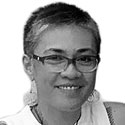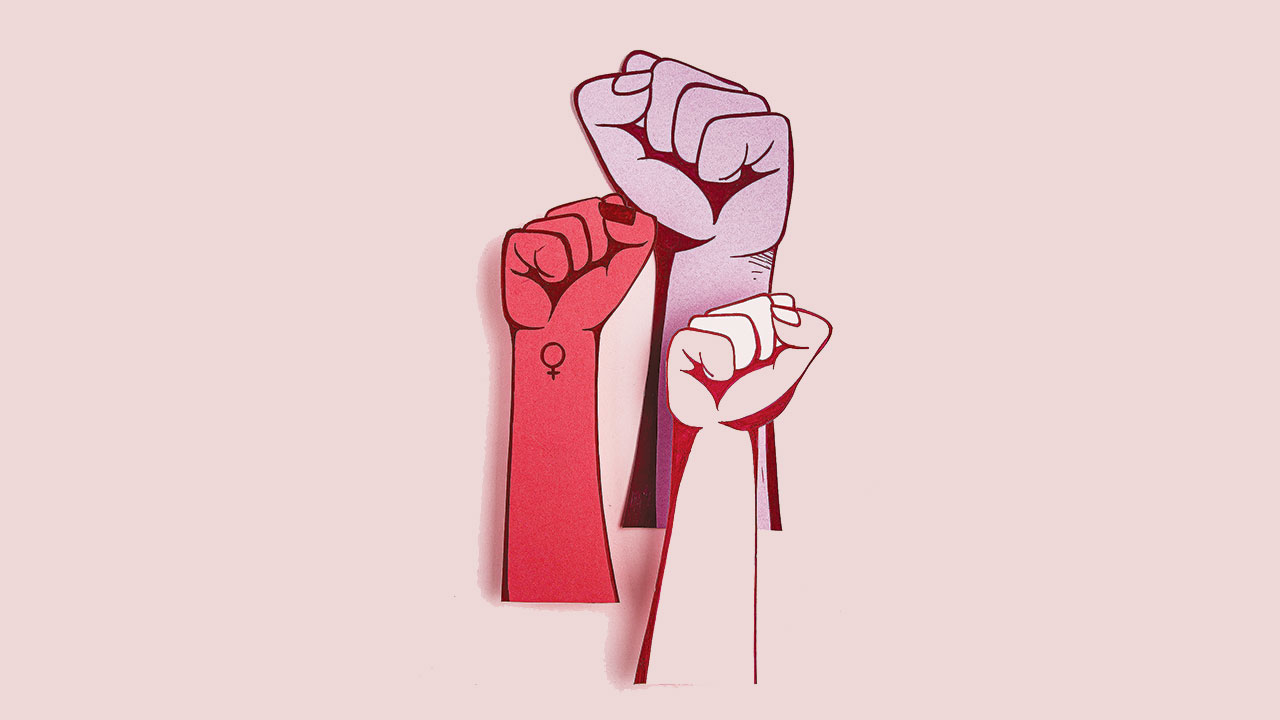
Blueboard
By Ma. Lourdes Veneracion

The “personal is political” is a feminist adage coined by Carol Hanisch in 1968 that challenged the public-private divide and conveyed the message that women’s everyday lives have political dimensions. Gender power relations, as embedded in wider social and political structures, are experienced by women in every aspect of their lives, in every space they move in, with every person they engage with. The slogan purposively reflects women’s emancipatory politics where individual agency, aggregated in collective movements, seek to disrupt discourses and practices that negatively affect women.
Within the experiential universe of systemic and systematic commission of atrocities during armed conflict situations or under authoritarian regimes, the “personal is political” is a reminder that though women have been victims of violence, they may move away from the “victim identity” to that of an “agentic identity.” In the context of transitional justice, it is important to identify women’s positionality as Fionnuala Ní Aoláin suggested: to distinguish “between women as objects of transitional justice processes (primarily as victims) and women as exerting autonomous capacity in these processes (as negotiators, political actors, and change agents).”
The Transitional Justice and Reconciliation Commission (TJRC) for the Bangsamoro identified the Malisbong Massacre as one of the emblematic examples of atrocities and crimes in Muslim Mindanao during the Martial Law period in the country. Malisbong, a barangay in Palimbang, Sultan Kudarat, was a site of violence from Sept. 22 to 24, 1974 and its gruesome tale is embedded in the lived narratives of witnesses and survivors: the killing of men initially detained at the Tacbil Mosque, the rape and sexual slavery of women aboard naval boats anchored at sea, and the suffering and death of children exposed to hunger, thirst, and heat. In recent years, it has been the topic of several documentaries (including Teng Mangansakan’s Forbidden Memory), increased media coverage, and institutional commemorations.
WOMEN AND THE COLLECTIVE POLITICAL
Telling and re-telling the story of the Malisbong Massacre did not appear in public consciousness until its 40th commemoration year when the Commission on Human Rights (CHR), then headed by its chairperson Etta Rosales, visited them. During this visit, Chair Rosales said:
“We are sincere. What we say, we will do. We will not sleep. We will not lose hope. While we are alive, while our spirit is alive, while our history is alive and while we continue to think that we should push forward and our call for action does not end, we will be victorious.”
Since then and because of the reparations program undertaken by the Human Rights Victims Claims Board (HRVCB), the story of the Malisbong Massacre seems to have been ever present in the discussion on transitional justice. Articles from the Moro Kurier entitled “Carnage at the Mosque” by Sheilfa Alojamiento and “Malisbong Pacific” by S.B. Alojamiento were reproduced by the Human Rights Violations Victims Memorial Commission (HRVVMC) in a reader they released in 2022.
However, there is still an untold story of the Palimbang women themselves. In 1999, a group of women victims/survivors and descendants of Malisbong Massacre victims organized themselves into the Social Worker and Coordinating Council (SWCC) with the aim to: 1.) struggle for self-determination; 2.) erase or diminish the agony they have been experiencing because of the massacre; and, 3.) work for lasting peace in their community. Hja. Maimona B. Abdul was the Founding Chair of the SWCC as well as the Bangsamoro Women in Palimbang — Moro National Liberation Front (MNLF). According to Samra T. Mohamad, current President of the SWCC, the organization was established by women who wanted to fight for their rights as well as the recognition of the violence that befell their community.
At the onset, the SWCC generated a 1,200-strong membership of women who became part of the continuing saga for truth and justice. Through women’s leadership, the SWCC were guided by the following principles: determination to achieve the change and justice they aspire for; collaboration to engage with various and relevant groups; commitment to assist their members and continuing their struggle; and cooperation with each other until they achieve their goal. They marched to General Santos City to make people aware of their struggle for recognition of the massacre; they visited the CHR in Manila using their own finances; and they organized the visit of CHR Chair Loretta Ann Rosales as well as the HRVCB in their community. According to Ms. Mohamad, the SWCC was also requested by the HRVCB to help in the drafting of the implementing rules and regulations (IRR) of the reparations program. They also worked with the Independent Working Group on Transitional Justice and Dealing with the Past (IWG TJDwP) through the Consortium of Bangsamoro Civil Society (CBCS) in engaging with the Municipal Government of Palimbang to draft a resolution on the commemoration of the massacre. These milestones, led by women, took years to unfold.
INSTITUTIONS (AND WHY THEY SHOULD STILL MATTER)
Early in 2019, the IWG TJDwP, along with the SWCC, sought an audience with the Sangguniang Bayan to propose the recognition of the Malisbong Massacre. Parallel to this process was the work of the Transitional Justice League (TJL) in seeking support from the CHR under Chair Jose Luis Martin “Chito” Gascon for a resolution recognizing the massacre.
On the 45th year commemoration of the Malisbong Massacre, hundreds of people from different barangays of Palimbang — women, men, children, and the elderly — marched towards the Tacbil Mosque where the massacre took place. Joining them were members of the Armed Forces of the Philippines (AFP) and the Bangsamoro Islamic Freedom Fighters (BIFF) as well as members of the IWG TJDwP, TJL, and CBCS.
During the program, messages of solidarity were shared by Cecilia Jimenez-Damary, Special Rapporteur on the Human Rights of Internally Displaced Persons; Guiamel Alim of CBCS and a convener of IWG TJDwP; Prof. Rufa Guiam, a co-convener of the IWG TJDwP; and Prof. Ma. Lourdes Veneracion, also a co-convener of the IWG TJDwP and from the Ateneo de Manila University. On this occasion, Robert Francis Garcia read CHR Resolution (V) No. AM 2019-183, “On the Recognition of the Palimbang/Tacbil Massacre and its Commemoration every 24th September” and Palimbang Mayor Joenime B. Kapina pledged that a municipal resolution will be passed on the commemoration. Mayor Kapina not only supported the Sangguniang Barangay’s resolution on the commemoration day of the massacre, but also sought to reimagine Palimbang from a site of transformation: a place of tragedy to a land of peace.
Several institutions followed suit, not just in commemorating the day of the Malisbong Massacre. For example, the Ministry of Social Services and Development (MSSD) provided relief assistance, while the Ministry of Public Order and Safety (MPOS), along with the Kutawato Green Initiatives (KGI), engaged people in the community to be part of social preparation for collective memorialization. And it was part of the “Weaving Women’s Voices” project of the Department of Political Science, School of Social Sciences, Ateneo de Manila University, which provided for a women-led participatory art narrative construction of the names of massacre victims engraved on marble.
LESSONS FROM WOMEN’S PERSONAL POLITICS IN TRANSITIONAL JUSTICE
The SWCC continue their struggle, this time toward meaningful, appropriate, and just compensation. As per the record, over a thousand people were killed during the Malisbong Massacre. But according to Ms. Mohamad, of the 1,020 claims filed with the HRVCB, only 26 were granted monetary reparations. This means that other people who suffered during the same event were not given the same compensation; there were even those not given compensation at all who continue to hold on to their claims dockets with the hope that they will also be compensated one day.
SWCC’s fight shifted from recognition of the Malisbong Massacre to the recognition of victims who were denied their claims due to a lack of documents and other technical requirements by the HRVCB. They call for the conduct of serious investigations on the victims themselves to weed out the fake ones. Fake claimants mingling with real ones contribute to the suffering and injustice felt by the actual victims themselves.
According to Ms. Mohamad, people are tired of being “researched” — as objects to be studied for the tragedy they experienced, and their stories told a multitude of times to so many people who rarely return to help them. “The untold story of women in our struggle is one of resolution, healing, and sustaining of peace.” She hopes that the polarization in the community because of a flawed reparations program will be resolved; she also hopes that external actors do not interfere in what the community has already decided in partnership with institutions from the Bangsamoro Autonomous Region on Muslim Mindanao (BARMM). The community should have their own agentic power to decide on their memorialization artifacts (which they already did). Having outsiders talking to different groups of people in the community has had the unintended consequence of re-polarizing them. Thus, instead of sustaining peace and healing, this national agency fuels an inter-community conflict rather than healing. May they uphold conscience over politics/politicking. Ms. Mohamad and the SCWW are aware of this and call for the cessation of the actions of this national agency interfering with their plans, ramming their alien ideas down the throats of the community people, and, worse, trying to convince municipal leaders to listen to their plans rather than the plans of the community and their BARMM partners.
May the SWCC continue their meaningful work, triumph over the external institutions cloaked in patriarchy that seek to have their way on how Malisbong should “memorialize” their lived collective trauma, and progressively, collaborate with civil society organizations and BARMM agencies that sincerely engage with them through inclusive collaboration. SCWW’s personal is most definitely political!
Dr. Ma. Lourdes Veneracion is an associate professor at the Department of Political Science, Ateneo de Manila University and director of its Asia-Pacific Center for the Responsibility to Protect-Philippine Office. She is also currently the vice-president of the Philippine Political Science Association.